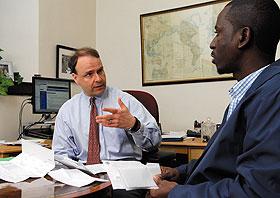  |
| HOME | THIS ISSUE | CALENDAR | GRANTS | BACK ISSUES | < BACK | NEXT > |
Online global component added to insurance law curriculum by Scott Brinckerhoff - April 28, 2008 | ||||
| International students have come to Hartford for many years to take courses from among those the UConn Insurance Law Center offers on how insurance works in the United States. Beginning next year, there will be a new course offered online, that will include material taught by professors in China and Italy. Distance learning has been evolving at the Insurance Law Center for years, but this is the first time UConn law students will be exposed to insurance as it functions in the European Union and China. The UConn Insurance Law Center is unique in its focus, according to Peter Kochenburger, its executive director. That’s not surprising, given that Connecticut employs by far the highest concentration of insurance workers in the nation. Many of the Center’s students who pursue a master’s degree (Ll.M.) in insurance law are employed in jobs related to the industry. Kochenburger says the decision to add an international flavor to the curriculum makes sense: “The concept of insurance is universal, although implemented differently around the world. In the United States, for example, each state regulates insurance as it sees fit, but in the European Union, there is significant uniformity across national borders.” He says the Center will always focus on U.S. law, but is likely to add more comparative courses, since insurance companies often do business around the world, and many students have – or will have – jobs that will require them to know something about international insurance. Professors Pierpaolo Marano of Italy’s University of Calabria and Richean Li of Beijing’s University of International Business & Economics will add a new twist to the Center’s online learning portfolio. The comparative insurance law course they teach will be tapped into electronically by students at their own schools as well as at UConn, even though they will be separated from each other by thousands of miles. Kochenburger will teach several sessions on insurance regulation in this country, to give the students – in Italy and China as well as at UConn – perspective. “It’s an experiment,” Kochenburger says. “We think we’re the first law school to offer online learning on this subject matter.” He says students have provided positive feedback on previously offered online courses. The new online course will work like those already offered, such as one on liability insurance, in which students participate in extensive online discussions and writing mirroring that of lawyers in practice. There’s a lot of reading, and often the subject matter stimulates lively debate. “The dialogue online,” says Kochenburger, “is often richer than in a classroom.”
Student Lauren Bayly says online postings are “more thought out than classroom banter, and can include links to interesting articles and related cases that help flesh out the issues.” Bayly and colleague Tracy Huang agree that online learning is both demanding and rewarding. Huang likes the flexibility of an online course, but says students still need to budget time to read other students’ postings, add their own, and keep up with reading and writing assignments. Since the class includes students with real-world experience in insurance, Huang says, they can learn from each other in a way that might not occur so readily in a traditional classroom. One discussion involved the Avon Mountain multiple-vehicle accident in 2005 when four people were killed in one of Connecticut’s worst accidents. The company that owned the truck that caused the accident had apparently canceled its insurance, meaning the truck was operating that day in violation of state law. Behind the tragedy, liability questions abound and the students dove into them. Did the company actually cancel its insurance for the truck, as the insurer successfully maintained in court? What liability should attach to the state, since Route 44, where the accident occurred, had been the site of numerous accidents over the years? What state laws should be amended in the wake of the accident? Should the victims’ families team up to pursue a civil suit? Any notion that an online course might be easier than one taught in a classroom is dispelled with a visit to the class web site. The enormity of a subject such as “liability” is immediately evident: each case is riddled with opinions, appeals, facts in dispute, and questions of coverage. “Online students must be diligent,” Kochenburger says. “They have to keep up with the material every week, and if they have trouble understanding an issue, it’s obvious to me right away. This gives me or other students an opportunity to quickly clarify the topic. I’ve had students tell me they taught themselves more in this course than they could have imagined. “Self-teaching,” he adds, “is an important component of online courses.” |
| ADVANCE HOME UCONN HOME |

